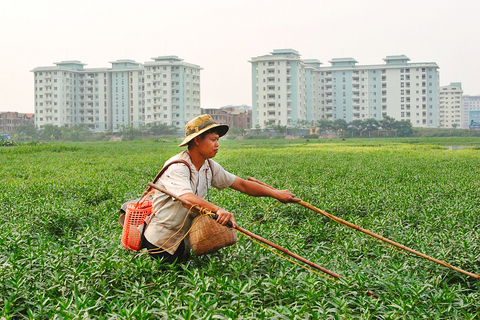When China joined the WTO in December 2001, its entry sparked jitters and a round of reassessments among Southeast Asian economies that were then just limping back to life after the devastating 1997 financial crisis.
Five years on, Vietnam's pending WTO entry has triggered a new rash of regional jitters, although certainly less pronounced this time around.
Vietnam is the rising star in ASEAN. It has boasted one of the world's fastest-moving economies in recent years following the classic ASEAN/Chinese success story of fueling growth on low-cost labor, export-oriented industrialization and foreign direct investment.

PHOTO: EPA
Entering the WTO will make Vietnam much more competitive when it comes to attracting investment away from ASEAN's former "little dragons" -- Indonesia, Malaysia, Singapore and Thailand.
And when its comes to attracting foreign investment, hype helps.
"For Thailand, it's not going to make it any easier," said Stefan Buerkle, head of business economics at the Thai-German Chamber of Commerce.
"Vietnam is a bit more sexy than Thailand, what with all the hype," he added.
Hype aside, Vietnam has made tremendous progress over the past decade in reducing its red tape, improving its business climate and generally putting out a more-welcoming welcome mat for investors.
With its entry into the WTO, the rest of the region will face stiffer competition for investment and trade, especially in labor-intensive industries such as footwear, garments and even electronics, adding to the pressure in these sectors are already coming under from low-cost giants China and India.
"The [electronics] sector is definitely being challenged from regional countries," said Ramya Subreameniem, economist with IDEAGlobal in Singapore.
Vietnam poses the prospect of more "hollowing out of computer peripherals," she said.
Singapore needs to continue concentrating on high-value products where it is doing well such as semiconductors, she noted.
Electronics factories produce nearly half of Singapore's non-oil domestic exports and account for 36 percent of the manufacturing sector.
Indonesia, where cheap labor continues to be a major selling point, can anticipate yet more competition from Vietnam as a WTO member, adding to the already stiff competition coming from low-cost China.
"If you're talking textiles and shoes, we're already threatened by China," acknowledged Chativ Basri, an economist at the University of Indonesia and sometimes advisor to Indonesian President Susilo Bambang Yudoyono.
Indonesia's once-prosperous shoe export industry, for instance, has been battered by slipping sales over the past five years after losing its competitive edge with China and up-and-coming Vietnam, while at the same time failing to move up the value-added chain.

Taiwan yesterday denied Chinese allegations that its military was behind a cyberattack on a technology company in Guangzhou, after city authorities issued warrants for 20 suspects. The Guangzhou Municipal Public Security Bureau earlier yesterday issued warrants for 20 people it identified as members of the Information, Communications and Electronic Force Command (ICEFCOM). The bureau alleged they were behind a May 20 cyberattack targeting the backend system of a self-service facility at the company. “ICEFCOM, under Taiwan’s ruling Democratic Progressive Party, directed the illegal attack,” the warrant says. The bureau placed a bounty of 10,000 yuan (US$1,392) on each of the 20 people named in

A Chinese aircraft carrier group entered Japan’s economic waters over the weekend, before exiting to conduct drills involving fighter jets, the Japanese Ministry of Defense said yesterday. The Liaoning aircraft carrier, two missile destroyers and one fast combat supply ship sailed about 300km southwest of Japan’s easternmost island of Minamitori on Saturday, a ministry statement said. It was the first time a Chinese aircraft carrier had entered that part of Japan’s exclusive economic zone (EEZ), a ministry spokesman said. “We think the Chinese military is trying to improve its operational capability and ability to conduct operations in distant areas,” the spokesman said. China’s growing

The High Court yesterday found a New Taipei City woman guilty of charges related to helping Beijing secure surrender agreements from military service members. Lee Huei-hsin (李慧馨) was sentenced to six years and eight months in prison for breaching the National Security Act (國家安全法), making illegal compacts with government employees and bribery, the court said. The verdict is final. Lee, the manager of a temple in the city’s Lujhou District (蘆洲), was accused of arranging for eight service members to make surrender pledges to the Chinese People’s Liberation Army in exchange for money, the court said. The pledges, which required them to provide identification

Nine retired generals from Taiwan, Japan and the US have been invited to participate in a tabletop exercise hosted by the Taipei School of Economics and Political Science Foundation tomorrow and Wednesday that simulates a potential Chinese invasion of Taiwan in 2030, the foundation said yesterday. The five retired Taiwanese generals would include retired admiral Lee Hsi-min (李喜明), joined by retired US Navy admiral Michael Mullen and former chief of staff of the Japan Self-Defense Forces general Shigeru Iwasaki, it said. The simulation aims to offer strategic insights into regional security and peace in the Taiwan Strait, it added. Foundation chair Huang Huang-hsiung